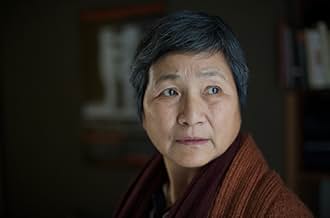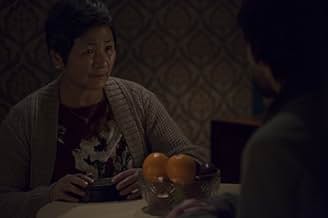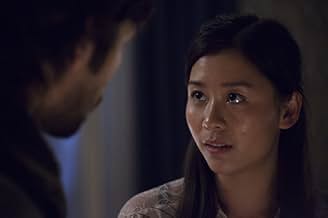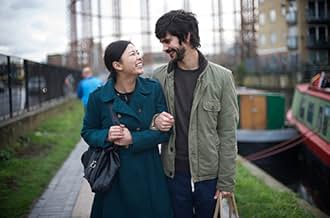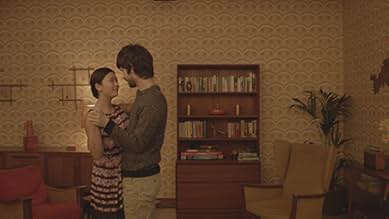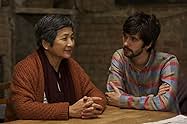Ein junger Mann chinesisch-kambodschanischer Herkunft stirbt und hinterlässt seine isoliert lebende Mutter und seinen Liebhaber, die beide trauern, jedoch kein einziges Wort der Sprache des ... Alles lesenEin junger Mann chinesisch-kambodschanischer Herkunft stirbt und hinterlässt seine isoliert lebende Mutter und seinen Liebhaber, die beide trauern, jedoch kein einziges Wort der Sprache des anderen sprechen.Ein junger Mann chinesisch-kambodschanischer Herkunft stirbt und hinterlässt seine isoliert lebende Mutter und seinen Liebhaber, die beide trauern, jedoch kein einziges Wort der Sprache des anderen sprechen.
- Nominiert für 1 BAFTA Award
- 4 Gewinne & 7 Nominierungen insgesamt
- Junn
- (as Cheng Pei Pei)
- Vann
- (as Naomi Christie)
- Waiter
- (Nicht genannt)
- Cafe customer
- (Nicht genannt)
- Elderly Resident
- (Nicht genannt)
- Café Customer
- (Nicht genannt)
Empfohlene Bewertungen
However Hong Khaou's film looks at the difficulties of communication at a much deeper level than the purely linguistic. He invites us to reflect on the wisdom of Kai's decision to put his mother in sheltered accommodation, whose dingy décor is designed to make elderly people 'feel better.' Despite Richard's basic kindness and his protestations of endless love for Kai, we wonder whether he actually understand what either Kai or Junn actually think. Maybe it's not really necessary to hire a translator: communication between individuals can take place at a subliminal level. Vann does her best to act as an intermediary between Junn and Richard, or Junn and Alan, but it's clear that her role is a peripheral one in the drama of familial relationships across cultures.
Shot in deliberately dark colors, LILTING depicts a world whose protagonists live in perpetual isolation, both literal as well as psychological. Junn's sheltered accommodation is both dark and prison-like; her fellow-residents seldom communicate except in clichés (Alan included). Richard's apartment is full of long, brick-lined passages; his kitchen is full of dirty cutlery, suggesting a fundamental inability to cope with life.
Our relationship with the two central protagonists is a complex one. Whishaw tries his best to render Richard a sympathetic character, but the more effort he makes to try and bridge the cultural differences separating himself from Junn, the more frustrated he becomes. His final outburst, where he accuses Junn of failing to "assimilate" to contemporary British cultures, is a classic colonialist statement, leaving us to reflect on why he himself did not do more to adapt himself to her mores. By contrast Junn remains both silent and serene; her final soliloquy reveals her determination to continue her existence, despite the prospect of future loneliness. She does not need to "assimilate"; she has found her own way to negotiate the culture she inhabits.
Modestly budgeted yet memorably staged by a director with an obvious affinity for the material, LILTING is an absorbing cinematic experience.
She relies on Kai's attentions and affections, but her isolation becomes utterly complete with his unfortunate death. Junn knew that Kai lived in a house with Richard (Ben Wishaw), but Kai hadn't told her they were together as a couple. Grief-stricken himself, Richard feels duty-bound to help Junn, but they don't even share a common language let alone know much about each other.
Alan (Peter Bowles) resides at the home too and starts an unusual relationship with Junn where they talk to each other in their own languages, not really knowing what on earth the other is thinking or talking about apart from physical gestures. Richard tries to help this sweet pairing by hiring a translator in Vann (Naomi Christie), so that they can communicate with each other. Its a way in for Richard to get closer to Junn, who has her own reasons for disliking him.
'Lilting' is the debut from writer-director Hong Khaou, who shines a light on contrasting cultures in the capital. Grief is foremost in the minds of all concerned, Wishaw is wonderful as the achingly suppressed Richard, who gradually releases his grief the more he gets to know Junn, showing her just how much he loved Kai. Pei Pei plays the stoic mother perfectly, you can see the isolation, love and grief in her eyes.
In light of the subject matter, the overall mood of 'Lilting' is quite forgiving. Junn and Alan provide the most endearing moments as well as some awkwardly comical scenes especially when they confess their bad habits to each other. Dealing with such weighty issues as love, memory, language and mourning, Khaou has directed an assured and thoughtful film full of subtle releases and deeply felt emotions.
The movie has a really good start, but after halfway through, the Director/Writer loses his way; it seemed as if he's not sure as to where to take the story. By the time it ended, I felt dissatisfied; the story should have been longer or the characters should have been explored and developed a little more.
The two leads, Ben Whishaw and Pei-pei Cheng, give quite strong and incredible performances; they have a few immensely moving scenes. And it doesn't hurt that Andrew Leung, the actor playing the deceased partner, is quite handsome; he and Ben looked quite good together, which makes his death even more painful.
The conversations the two lead characters share are quite moving and thought-provoking, and the monologue Junn has towards the end on the essence of grief and crying is really beautiful. Let me quote the most effective lines from it: "These memories are all I have; I need to keep them vivid, or they'll fade like the face of my husband. I want to dwell on these memories and cry over them because they comfort me. Through plenty of crying, I've learnt to be content that I won't always be happy, secure in my loneliness, hopeful that I'll be able to cope."
The movie is depressing, yet uplifting, but somehow I feel, it failed to reach its true potential.
Perfectly clear throughout the whole running time is that Junn and Richard belong to two different worlds. There is much more than merely a language barrier that withholds them from really communicating. The interpreter he hired, Vann, dismisses Junn's lack of knowledge of the English language, calling her a "lazy bitch" which was obviously a common phenomenon under female immigrants. On one hand they could depend on their spouse or children to interface with the outer world, and on the other hand it demonstrates Junn's bland refusal to adapt to the world where she lived in for many years. That also explains how the English way to take care of the elderly, being very different from her own traditions, stood between Junn and Kai for a long time, in spite of Kai repeatedly saying that the home for the elderly she was put in, was just a "temporary" measure. Anyway, Kai did not have to cope with a language barrier, and still failed to drive the message home, particularly as he kept postponing a decision to explain the real relationship between himself and Richard, fearing she would not understand and working disruptively on the relationship between mother and son.
A nice find is the introduction of Alan as Junn's would-be lover. They "dated" several times before, both without understanding a word what the other was saying. This courting formed an excuse for Richard to hire Vann as an interpreter, fitting nicely his own hidden agenda to come closer to Junn. The relationship between Alan and Junn changes as soon as their communication improved. It brings several differences to light, some not so important but others seemingly insurmountable. Junn is not the modest passive woman we assumed at first sight; she can make her position very clear when felt necessary.
The final scene demonstrates hope for their future. Junn and Richard seem to be able to communicate without interpreter Vann translating each sentence (this is rather implicit, but even I understood by virtue of their body language). We see a mutual trust and understanding growing between the two when exchanging sentences, in spite of not really knowing what the other was saying. I must admit being a bit lost during this final scene. It took some time on the way home to grasp all the things that were shown implicitly. The preceding scenes were abundantly clear in comparison, but this one needed some afterthought. We can imagine for ourselves how their relationship is about to continue, this being left as an exercise for the viewer.
Wusstest du schon
- WissenswertesFilmed in 3 weeks.
- PatzerAt the scene when Ben Whishaw and Andrew Leung were on bed, Ben says "You're really gonna do that?", but his lips don't move.
- Zitate
Junn: Through plenty of crying, I've learnt to be content that I won't always be happy, secure in my loneliness, hopeful that I will be able to cope. Every year on Christmas Day I get very lonely. An incredible feeling of solitude. On this day, everything has stood still, even the trees have stopped rustling, but I'm still moving, I want to move, but I have nothing to move to, and nowhere to go. The scars beneath my skin suddenly surface and I get scared. Scared of being alone.
- VerbindungenFeatured in Lilting: Deleted Scene (2014)
- SoundtracksYe Lai Xiang
Performed by Xiang Lan Li
Top-Auswahl
- How long is Lilting?Powered by Alexa
Details
- Erscheinungsdatum
- Herkunftsland
- Offizieller Standort
- Sprachen
- Auch bekannt als
- Sevgilinin Ardından
- Drehorte
- Produktionsfirmen
- Weitere beteiligte Unternehmen bei IMDbPro anzeigen
Box Office
- Bruttoertrag in den USA und Kanada
- 27.054 $
- Eröffnungswochenende in den USA und in Kanada
- 1.567 $
- 28. Sept. 2014
- Weltweiter Bruttoertrag
- 247.377 $
- Laufzeit
- 1 Std. 23 Min.(83 min)
- Farbe
- Seitenverhältnis
- 2.35 : 1








